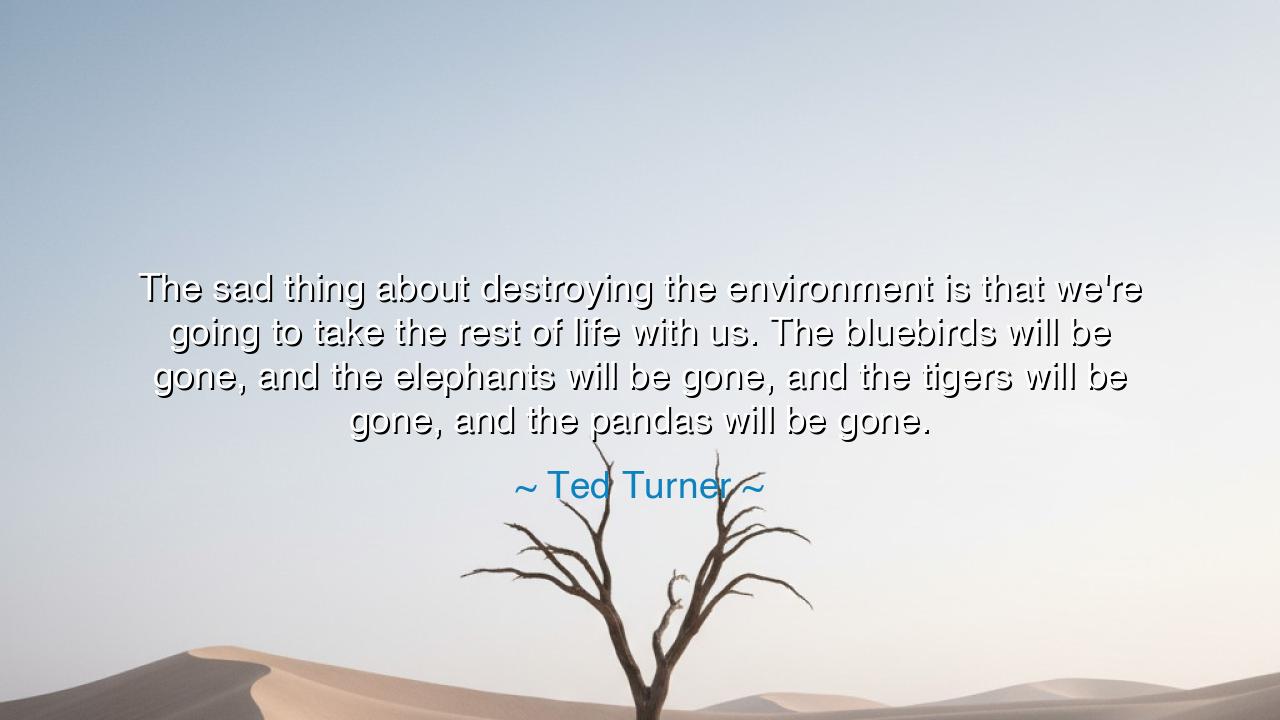
The sad thing about destroying the environment is that we're
The sad thing about destroying the environment is that we're going to take the rest of life with us. The bluebirds will be gone, and the elephants will be gone, and the tigers will be gone, and the pandas will be gone.






In the mournful yet awakening words of Ted Turner, we hear the lament of a seer who looks beyond human pride and sees the sorrow of the Earth itself: “The sad thing about destroying the environment is that we're going to take the rest of life with us. The bluebirds will be gone, and the elephants will be gone, and the tigers will be gone, and the pandas will be gone.” These words are not a prophecy — they are a warning, spoken from the edge of a precipice that humanity has carved with its own hands. Turner, a man who built empires of communication, turns his voice here toward the most ancient conversation of all: the one between man and nature. And he reminds us, with sorrow and clarity, that when we wound the Earth, we wound ourselves.
For the ancients believed the world was alive — not metaphorically, but truly. They spoke of the Earth as Gaia, the mother of all things, and every creature as her child. To them, to harm the forest was to break the skin of the divine, to poison the river was to silence her song. In Turner’s lament, this sacred understanding returns like a forgotten hymn. When he names the bluebirds, the elephants, the tigers, and the pandas, he is not merely listing animals — he is naming the sacred threads of the web that sustains us. If those threads are cut, the web collapses, and humanity — so proud, so blind — falls with it.
There is deep sadness in his tone, but there is also truth: our fate is intertwined with every living thing. Modern arrogance has taught us to see ourselves as separate — masters of nature rather than part of her body. But the air that fills our lungs is the breath of trees, the food that nourishes us comes from the humblest soil, and the balance of the oceans governs the pulse of our weather. When the bluebird vanishes, a piece of joy is lost from the sky; when the elephant falls, a memory of the ancient Earth dies. And in their silence, we lose a reflection of our own soul — for each creature carries a fragment of the beauty and wisdom that once kept humankind humble.
History is filled with examples of civilizations that forgot this bond and paid the price. The Maya, who once flourished amidst lush forests, stripped their land bare to feed their temples, and the rains ceased. The Easter Islanders cut down every tree, and their society crumbled beneath famine and despair. Their downfall was not because the Earth sought vengeance, but because they severed the natural harmony that sustained them. Turner’s warning is born from this same ancient lesson: when humanity destroys its home, it does not die alone — it drags the innocent down with it. The tiger, the panda, the bluebird — all become casualties of our forgetfulness.
Yet, though his words are tinged with grief, they are not hopeless. There is still the chance for redemption, if only we awaken. The ancients would say the Earth is patient — she renews, she forgives, but not endlessly. We must become once again her guardians, her stewards, her children who remember how to give back. In every act of planting a tree, saving a river, or protecting a species, we begin the work of healing. To care for the bluebird is to protect the sky; to care for the elephant is to honor the wisdom of endurance; to care for the tiger is to preserve the fire of wildness that reminds us who we once were.
Even in the smallest gesture — refusing waste, cherishing simplicity, or teaching our children to love what is living — we participate in a quiet revolution. For no government or hero will save the Earth alone. It will be saved by the hearts of countless ordinary people choosing reverence over convenience. As Turner’s lament implies, we are both the destroyers and the saviors of our world. The power that ruins can also restore.
And so, let this be the teaching for all generations: we do not own the Earth; we belong to it. Every songbird, every forest, every ocean wave is part of the same sacred body that gives us life. When we destroy, we die a little; when we protect, we live more deeply. The sadness in Ted Turner’s words must become our strength — for from grief can come awakening. Let us honor the bluebirds and elephants, the tigers and the pandas, not as distant creatures, but as kin. Only then will humanity learn to walk gently again upon this fragile and holy Earth — the only home we shall ever have.






AAdministratorAdministrator
Welcome, honored guests. Please leave a comment, we will respond soon